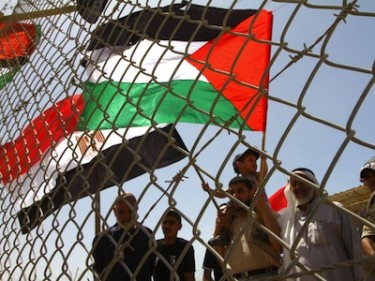This post is part of our special coverage Egypt Revolution 2011.
On May 28, 2011, Egypt opened the Rafah Crossing between it and the Gaza Strip, supposedly on a permanent basis. However, Palestinians soon discovered that Egypt was limiting the number of people who could pass through the crossing, and thousands were left waiting in frustration. A week later the crossing was closed again by the Egyptians, “due to renovations“.
Still living under an Israeli blockade, bloggers in Gaza are angry that the promised freedom of movement to Egypt has not materialized. Sameeha Elwan's mother has been waiting to go to Egypt for urgent medical treatment:
Everyone was very enthusiastic about the news of opening the only official border between the Gaza Strip and Egypt, I was not less enthusiastic. It was such a relief. Even with the restriction on the movement that took place only two days after the glorious news. It sounded a relief. But, it never does when you are one of the 400 other travelers who’d get turned back or who are denied access or those who have to wait. I understood how difficult it is to wait. How painful! How tortuous! But, we Palestinians seem to be destined for waiting.

Palestinians take part in a rally at the gate of Rafah border crossing. Image by ASHRAF AMRA copyright Demotix (28/05/11).
At Sleepless in Gaza, Nader writes about visiting the crossing to see for himself:
June 2nd 2011 was the first time for me to ever see the border. On the gates, I was literally jumping out of excitement that I have finally seen what is the border like with my own eyes. There was security by the gate and this huge gate, and many people were outside waiting either for friends or relatives to arrive or waiting for some traveller who wants to get the bags carried to a taxi, as a way of breadwinning.
As I waited for over 20 minutes in the hot sun waiting for the guards to let me in, I witnessed how it is like to arrive for the first time in so many years. Hugging each other so hard, kissing each other’s cheeks. And what were heart-touching the most is the happy tears. I could feel a lot whenever I witness such scenes.
As we entered the gates, we took a taxi to take us to the departure hall, where I entered with total excitement. I look around and all I see is tired people with pale looks and hopelessness. It was 4 PM by then and the borders close at 6 PM. Kids, old men and women.
The people there were of almost all ranges of ages. I talked to a few of them asking them about what is happening and why are they still in the departure hall. Finally, I came up to the conclusion that the Egyptians don’t let more than 350-400 passengers pass a day.
Ola Anan writes:
النقطة التانية انو موضوع الترميم كله على بعضه مش منطقي !
The second point is that of the renovation; it’s completely illogical!
Laila El Haddad posts this video:
A fantastic video shot by a group of Palestinian activists exposing the realities of the much heralded opening of Rafah Crossing, which has been closed for the third day in a row.
Back to Sameeha Elwan, who concludes:
Last year, I was asked by a journalist whether I remember a time when there were no restriction over movement or when we were able to travel freely. It didn’t take me much time to answer with a “No”. I still remember how we used to celebrate my uncles by making them big banquets every time anyone of them would make it to Gaza in a day or two. While celebrating their victorious effortless 3-day journey of return, we would be chatting of the way the Egyptians, the Israelis and the Palestinians would each treat Palestinian travelers.
If I’d be asked the same question today, looking at the packed bags leaning along the room, I would still answer: No.
This post is part of our special coverage Egypt Revolution 2011.






